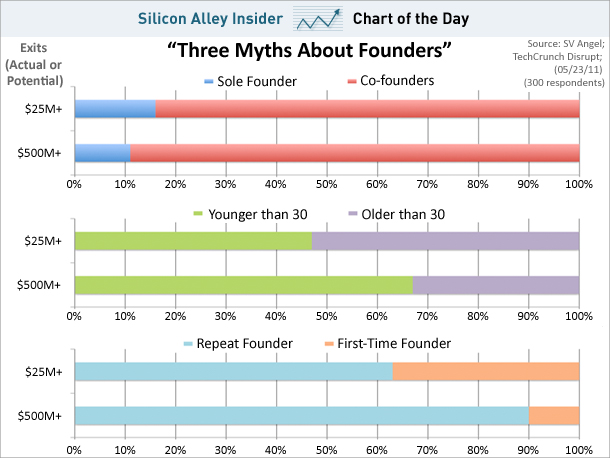During a recent interview over at Tech Crunch, Michael Arrington exclaimed, “Old People Suck at Startups”. The backdrop – a conversation on startup myths – had interesting data on the age and entrepreneur experience which drew from startups at $25M+ and $500M+ actual or potential exit values. The breakpoint for “old” was age 30. If you’re over 30 (or 40 or 50 … or …) you might take offense to being painted into a decrepit category! Moving beyond the data, the interesting questions may be what drives the circumstances of entrepreneurs and what do they do as they become … ahem … “old”?
Let’s take a quick look at Silicon Alley Insider’s composite chart which effectively encapsulates the founder age and experience data:
I have five observations which may have some insight as to how age plays into startups as well as what those “old guys” end up doing.
- Let’s not confuse tech startups as being about code and computing devices. Tech upstart has largely become a social R&D activity with technology as the medium. Early adopters are largely in the younger age bracket. Who better to understand younger people than young entrepreneurs?
- Someone under 30 is more likely to be in a current lifestyle that allows them to deal with “less” in financial and life factors terms (e.g. complexity, stability). By the thirties many have a wife, kids, have bought at least one or two nice cars, experienced a few nice vacations, some good paychecks and bonuses, become accustom frequent dining at good restaurants … you get the picture.
- Naivety is a powerful tool. When someone doesn’t have specific experience with the difficulty of a goal, one is not constrained by the reality of difficulty – they often just forge ahead. There are many things I’ve accomplished in my life that, if I had known what it took a priori to tackling them, I may well have never embarked. So contrary to popular belief, knowledge can be a curse to an upstart ever seeing the light of day.
- Older upstarters tend to reinvent themselves in other aspects of their lives, when work factors drive toward stability. Often the reinvention is in the form of hobbies and alternate vocations.
- Finally, older upstarters end up reshaping existing (not startup) organizations. Existing organizations are far more risk driven (the business has more to lose than a few million dollars for example) – those with significant experience leading several companies are paid for the belief that their experience and track record can minimize the risk of remaking existing companies or taking them to new markets. Existing companies can also afford to pay, often handsomely, for that value.
With all that said, there is a place for everyone to invent and create at any age!








You must be logged in to post a comment.